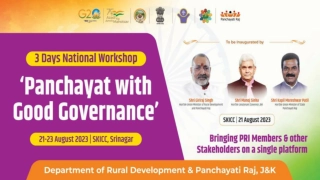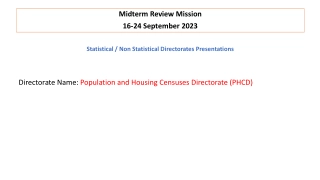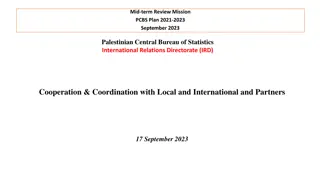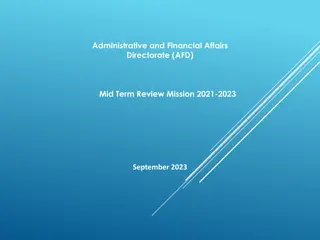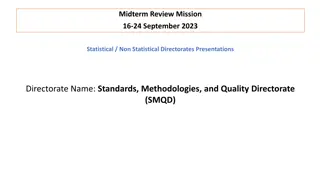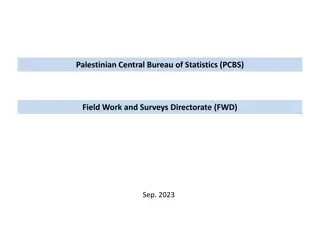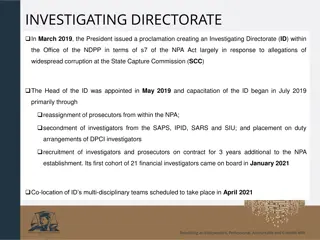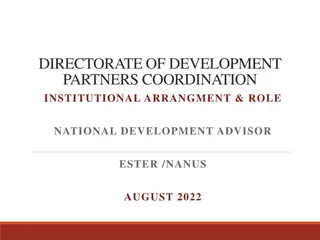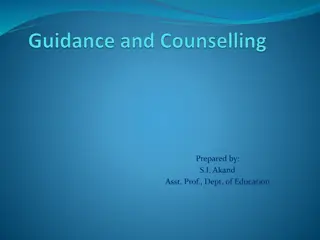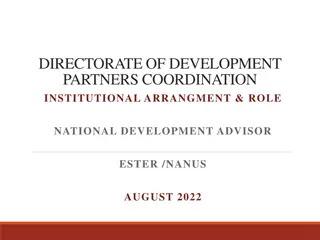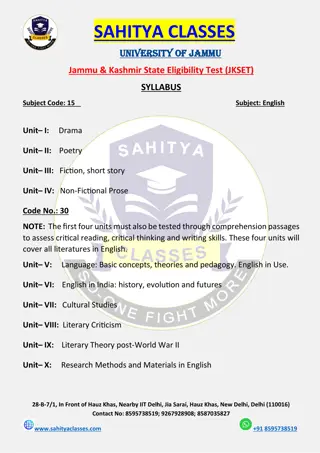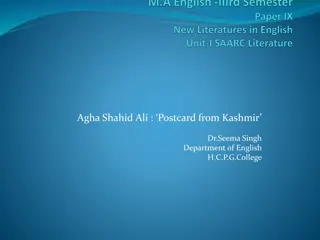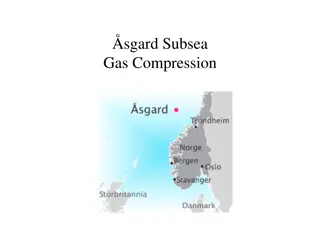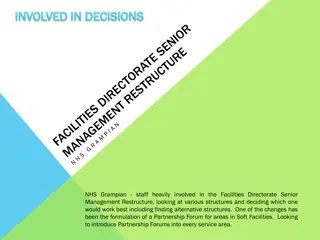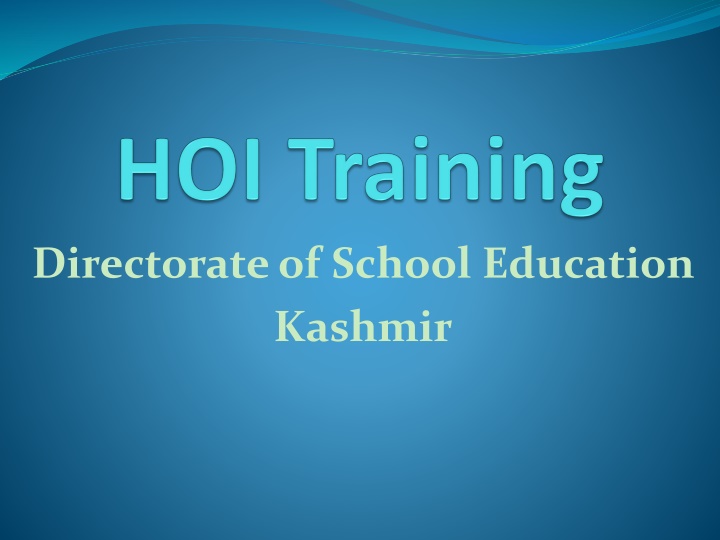
Directorate of School Education Kashmir Academic Guidance
This academic planner and assessment schedule provide a structured framework for school activities, teaching methods, assessment timelines, and parental involvement in the education system. It emphasizes tracking learning outcomes, community engagement, and celebrating progress. The documents outline the number of working days, assessment periods, teaching schedules, and opportunities for student development. The focus is on creating a holistic educational environment that promotes accountability, value-based education, and student performance evaluation.
Download Presentation

Please find below an Image/Link to download the presentation.
The content on the website is provided AS IS for your information and personal use only. It may not be sold, licensed, or shared on other websites without obtaining consent from the author. If you encounter any issues during the download, it is possible that the publisher has removed the file from their server.
You are allowed to download the files provided on this website for personal or commercial use, subject to the condition that they are used lawfully. All files are the property of their respective owners.
The content on the website is provided AS IS for your information and personal use only. It may not be sold, licensed, or shared on other websites without obtaining consent from the author.
E N D
Presentation Transcript
Directorate of School Education Kashmir
Academic Planner A readymade reference for School Activities that includes both Academic & Co-Curricular Activities for engagement of Children A document that reflects Philosophy behind School A document that guides teachers about the methods of Teaching Learning right from ECCE stage to Elementary Stage. A document to Track and Assess Learning Outcomes of the Child. Information about School Working Days Information about Periodical Assessments in School. Curriculum Tracking Remedial Education. Community & Parent Involvement. Accountability of Teachers & Students Emphasis on value based Education. To Educate Students by celebrating Important days. School Clubs School Houses for Discipline , Punctuality & School Ownership of Child School Grading based on the Performance of Schools (School Performance Index). Felicitating Performing Schools & Supporting low performers 1. 2. 3. 4. 5. 6. 7. 8. 9. 10. 11. 12. 13. 14. 15. 16.
Some Recommendations Teacher s Manual for ECCE & Early Grades Consultation of Learning Outcomes document The Number of working days w.e.f 15thNovember 2019 to 31st October 2020 shall be 210 days (Right To Education complaint) excluding Winter break, summer break & other scheduled holidays. Commencement of Academic Activities w.e.f 15thof November from Class 1stto 9th
Assessment Schedule year 2020 Assessment w.e.f 9thMarch 2020 Assessment w.e.f 25thApril 2020 Unit I Unit II Term I Examination w.e.f 2ndweek of June 2020 U III Assessment w.e.f 1stweek of August 2020 Term I Examination w.e.f 2ndweek of October 2020 Declaration of Result/Progress Day on 25thOctober 2020 New Classification w.e.f 1stweek of November 2020
Opportunity Days Teaching of Unit Syllabus Term & No. Of Teaching Days (Opportunity Days) 38 Days U-1 U-2 37 Days T-1 43 Days U-3 38 Days T-2 54 days Total No. of Days 210 Days (RTE Compliant)
Progress Day/Result day In order to keep the parents abreast with the performance of children, the cumulative record cards duly prepared should be provided to the parents on the day of result. The day should be celebrated as the Progress day in every school where the parents, community members should be invited to share their views. The programme of Progress Day should be personally monitored by DRGs, ,ZEOs Cluster Heads, DIET faculty and Chief Education Officers. They shall also formulate a reformative plan for low performing students with due involvement of concerned teachers. On the penultimate day of opening of school, a meeting of all stakeholders including VECs, SMCs, PRIs (around 15 people) to be convened to formulate Institutional Plan with explicit Learning goals for the forthcoming session. The same be shared with concerned ZEOs, Principals & Cluster Heads, DIET Principals & CEOs
Practical Work, Remediation & Co-Curricular Activities The practical /Project Work of Secondary & Higher Secondary should also be distributed evenly Unit/Term-Wise. The Practical /Project Work must be a mandatory exercise for the students of Secondary & Higher Secondary Schools and should be countersigned by the Head of the Institution after every Unit/Term Test. In case it seems that the syllabus transaction targets are missed by any teacher/s, the extra morning and evening classes for the subject/s should be started atonce. Since the sole purpose of teaching learning is to make a student understand and built his/her capacity besides giving skills, therefore the remediation mustconcurrentlyrun with theclass work. In case of Potential learners having huge learning gaps, separate Remedial Classes should be started at the beginning of the academic year during morningsorevenings. Every week, there should be some Co-Curricular activity in the second half of each Saturday like sports, debates, Quiz, Seminars etc., These activities should collate with the curriculum to make the core academics more attractiveand joyful.
PTAs, Pace Setting, Knowledge Register Moral Education & Sports Events Parent Teacher Association (PTA) meet must be conducted once in a month (3rdworking day of month) to restore public faith in the system and to have a feedback. Same Way VEC/SMC meeting to be conducted monthly. After every two months, there should be outing for the students (with due permission from authorities) to have subject related tours to the University Campus, Archaeological sites Industrial areas, historical places, Botanical gardens and Museums, Fish Farms, Wildlife Sanctuaries, Nature study, local places of interest etc., the dates& destinations for which should be notified by the school authorities at the beginning of the session for entire academic session. Further, in order to give exposure to the students, some special visits should be planned to Hospitals, Post Offices, Banks, other establishments and local artisans to capture their working. Also Girl students should be especially made to interact with lady doctors, engineers, artisans, bankers and other officers for their inspiration. Eminent Community leaders, Litterateurs, famous persons, experienced local octogenarians/older citizens to be invited to schools for interactions with the children to collect the legacy from them and gain from their experiences of life. The experience shared by them must be recorded in the register to be specifically kept for the purpose under the name of Knowledge Register .
PTAs, Pace Setting, Knowledge Register Moral Education & Sports Events Attendance of students should be seriously made obligatory to strengthen the school system; if possible, option of Bio-Metric Attendance for students of High & Higher Secondary Schools may be practised. Attendance of students for Practical Work in Higher Secondary Schools should be at least done through the Bio-Metric Attendance System with proper arrival and departure time. Marks for the attendance (in practical classes) should be awarded as per the actual attendance. Emphasis on Moral Education: Morning Assemblies to be tapped for imparting Moral Education by means of Stories on Moral Education, participation of Students in different activities reflecting Morals. Also Morals should be taught across curriculum i.e., teaching of Moral Education through Academic subjects and above all Teacher being a role model should reflect Morals so that students catch the reflection. Sports events: The Schools should frame sports activity calendar after due consultation with Department of Youth Service & Sports
Calendar of Activities Consult Planner
Suggestive School Clubs Eco Club: For Environmental Concerns like Environmental degradation, conservation of natural resources, biodiversity & its conservation, Herbal Gardens. Awareness campaigns, Wildlife. The activities can include Nature Walks, Maintenance of Herbal Gardens Sports Club: Promotion of sports especially non-conventional & indigenous sports like Javelin throw, Discuss throw, High Jump ,Long Jump, Race, Hopscotch (Vern: Sazlong) ,Santooli (vern; Kulgarm) ,Gilli Danda. Adventure Club: Promoting adventure sports Rafting, River Crossing, Mountaineering, Snow tubing, Tracking, Cycling, Road safety and Visits to Forests Science Club: For Science Popularisation & allied activities, botanical tours, Tours to Wild Life Sanctuaries ,National parks, Museums Culture,Art & Heritage Club: For Preservation of Culture & Heritage and promotion of Art & Craft.
Suggestive School Clubs Social Activity Club: For promoting Social Activism among students. Counselling Clubs: Career counselling for different career opportunities for students, legal counselling, Psychological Counselling etc., Counselling on Drug de-addiction. Health & Hygiene Club: School Hygiene conducting Health Check-ups and related activities in collaboration with Department of Health, MDM. School Safety & Disaster Management Club: Safe Learning, Care & Protection related laws ,spelling out Standard Operating Procedures (SOPs),Safe School Environment(Infrastructural & Psychological) , Prevention of Child Abuse, Transportation issues ,Positive discipline ,Disaster Preparedness, Legal & Electoral Literacy Club:- Club for Legal and Electoral Awareness, Adult Franchise etc.,
More Activities Houses:-As this practice is in vogue in most of the schools, every School shall comprise of 4 houses among which all the students and staff of the school would be equally divided. The names of the houses be designated on the basis of heritage,Sufi saints, Poets, Prominent Rivers, Flowers, Great Personalities etc., Students shall be nominated as House Captain, House Vice- Captain and would carry badges for the academic year. These houses shall rotate their work on weekly basis. Points shall be added/ deducted from the house tally on weekly basis according to the performance of the house in organising Morning assembly & School discipline. Felicitations of houses should be done. ANNUAL DAY:- Celebration of Annual Day by all schools particularly High and Higher Secondary Schools shall be mandatory, for which dates shall be notified in advance and shall be cerebrated before annual examination.
School of the year At the end of every academic session one of the Elementary Schools shall be judged as the School of the Year at Zonal, District& Divisional Level based on School Performance Index (SPI) which will be based on online Academic Monitoring of different subjects strictly according to the Learning Outcomes document of NCERT/Samagra Shiksha and School Academic Processes Tracker. The SPI will further include indicators on Implementation of ECCE, Student s attendance, Teacher attendance, effectiveness of Remedial Classes, minutes, decisions & their implementation in Parent Teacher Association (PTA) meetings and Knowledge Register maintenance. The online monitoring and the punching of results will help us to generate school results (SPI) besides capturing of other indicators with respect to this Academic Plannerand subsequently the schoolswill accordingly be graded into Green (Schoolswhere learning levels & otherparameters aregood). Yellow (Schoolswhere learning levels & otherparametersareaverage). Red (Schoolswhere learning levels & otherparameters belowaverage).
Online Academic Monitoring
Online Academic Monitoring & School Tracking system using Google Docs through a network of DRGs, ZRPs and CRPs-Learning Level Assessments (Elementary) As mentioned in Academic Performance Index (SPI) Engagement ,School Activities and Learning Levels as per Learning Outcomes Assessment & School Processes Tracker (Assessment Tool) has been formulated. Team DRGs ,ZRPs & CRPs visit elementary schools and apply this AssessmentTool in these Schools. The School Processes are punched online on Mobile Phone in App/Google Doc in assessmenttool . We get Real-time capture of School Performance Index a snapshot of District-wise, Zone-wise and School wise performance of Children & School. Planner, School which reflects Children ,an online Academic
Online Academic Monitoring & School Tracking system using Google Docs through a network of DRGs, ZRPs and CRPs-Learning Level Assessments (Elementary) Concerned ZEO shares the School Performance Reports with Headmasters in the Monthly Meeting and reflects accordingly. ZRPs/CRPs/DRGs render on site Academic support to the schools based on the outcomes of the school. CEO/DIET Principal holds Monthly review ZEOs on the School Performance of his/her Zone. DSEK team/SIE review CEOs/Principal DIETs on the school performance of their districts. School Grading is done and the performing schools to are felicitated and under performers are given special focussed upon.
Provision of Assured Minimum Facilities
Drinking Water facility Action Steps to be taken Indicators Present Status Who to do it? Timeline Source of drinking water facility Process of purification of drinking water in school Availability of Drinking water in the school Whether Drinking water is stored in overhead tank/s Number of times overhead tank/s were cleaned during the current year. Cleanliness around drinking water facilities is done:
Toilet Facility Action Steps to be taken Indicators Present Status Who to do it? Timeline Total number of toilets available Number of functional toilets for Boys Number of functional toilets for Girls Number of functional toilets for CWSN Number of functional toilets for Staff Urinals available for boys Availability of water for flushing and cleaning of toilets Cleaning of toilet Availability of soap for hand washing Mechanism for sanitation and cleanliness of toilets Availability of dustbin, bucket, mug etc. Hinge Lock Pink colour for Girls toilet
Beautification of School & Surroundings Action Steps to be taken Indicators Present Status Who to do it? Timeline Availability of playground Boundary wall Levelling of ground Maintenance of ground Arrangement for outdoor games Beautification of lawn
Classroom Environment Action Steps to be taken Indicators Present Status Who to do it? Timeline Space Heating Cooling Lighting Matting Blackboard/Furniture Seating Arrangement Learning Corners Display of Students
Kitchen Shed Action Steps to be taken Present Status Indicators Who to do it? Timeline Availability of Kitchen Shed Availability of water Drainage facility Cleanliness Adequate and sufficient Utensils Storage Bins
Ramp facility Present Status Action Steps to be taken Who to do it? Timeline Indicators Availability of Ramps for all building & toilet block Whether slope of the Ramp is as per the 1: 12 ratio Present condition of Ramp Whether Ramp is usable in All weather conditions
Electricity and Gadgets Present Status Action Steps to be taken Timeline Indicators Who to do it? Whether all rooms have adequate electric lights and fans. Wiring, lights, fans and switch boards are in good condition. Is back-up facility for power failure?( Generator) Whether MCB are in place to prevent fire due to short circuit. Whether electric fitting and appliances are safely installed in order to ensure safety of students. In case of fire/emergency/natural calamity whether school has a proper evacuation plan for students / safe exit.
Institutional Planning SWOT Analysis School Details Instructional Days Academic Year Details Human Resource Details Club Details Annual Activity Calendar School Infrastructure School Mapping & School Improvement Plan Financial Aspects Major Achievements General Guidelines
Framework for Institutional Plan SWOT Analysis Institutional plan refers to a plan which helps us to know the institution, its strengths & weaknesses. It is a statement of intentions which reflect the school s vision for the academic session in general & future of the institution in particular. The process involves reaching agreement on a sensible set of priorities for the school and then taking action to realize the plan. A good institutional plan should result in enhanced quality of performance of school & its students. It should be in tune with Academic Planner of DSEK and should aim to track the Planner in School
General Instructions 1. The role of Institutional plan is to fill the vacuum in the current understanding of education systems and provide the basis for further educational development. 2. Understanding the vision, mission and goals of an institution in the planning process. 3. Become aware of different plans and organizing skills required as a school teacher and head of the institution. 4. Develop an insight into the responsibilities and the leader in professional growth, commitment, competencies, attitudes, school development plan, physical and human resource management, time management and community relations. 5. Train the teachers and head teachers in planning and executing the curricular and co- curricular programmes of the school. 6. Adopt ICT in the process of Planning and Organization of school activities. 7. Understand the needs of alternative education and integrate it into the curriculum. 8. Develop in the student and teachers the classroom management skills. 9. Prepare the student & teachers in using different tools and techniques for continuous and comprehensive evaluation. 10. This framework is only suggestive. The schools can alter it as per their local context and needs.
School Details 1.Brief historical development of the Institution (with Geography of the surrounding area): 2. Objectives of the Institution (Specific only): 3. School Particulars: I. School Name . School Name: : II. UDISE Code: II. UDISE Code: III. Rural / Urban III. Rural / Urban IV. Village & Habitation IV. Village & Habitation Name Name V. Pin V. Pin Code Code VI. Municipal Ward VI. Municipal Ward No No VII. Educational VII. Educational Zone Zone VIII. Name of VIII. Name of Cluster Cluster IX. Assembly IX. Assembly Constituency Constituency X. Revenue X. Revenue Block Block XI. Year of XI. Year of Establishment Establishment XII. Distance in KMs from: CEO Office: _________, DIET:_________, SIE/SPD office________, XII. Distance in KMs from: CEO Office: _________, DIET:_________, SIE/SPD office________, DSEK: ___________, Public Library: ________, Police Station: __________, Fire Service: ______ DSEK: ___________, Public Library: ________, Police Station: __________, Fire Service: ______ XIII. No. of staff members:____________ (Male ____/Female____) XIII. No. of staff members:____________ (Male ____/Female____) (Masters_____, Teachers___________, Lecturers_________) (Masters_____, Teachers___________, Lecturers_________) Whether Head of the institution is in place. (Yes/No)__________, if No mention the name and designation Whether Head of the institution is in place. (Yes/No)__________, if No mention the name and designation of in charge HOI. of in charge HOI.
Instructional Days Total number of instructional days during the last academic session Stage Primary Upper Primary Secondary Higher Secondary No. of Days Remarks Primary A.Elementary A.Secondary A.Higher Secondary
Academic Year Details (Previous Year) Pre- Primary I II III IV V VI VII VIII IX X XI XII G B G B G B G B G B G B G B G B G B G B G B G B Classes General Girls Boys SC ST OBC CWSN Total
Academic Year Details (Current Year) Pre- Primary I II III IV V VI VII VIII IX X XI XII G B G B G B G B G B G B G B G B G B G B G B G B Classes General Girls Boys SC ST OBC CWSN Total
Human Resource Available (Faculty Profile) S. No. Name of the Principal/ Headmaster/ Lecturer/ Master/ Teacher/ Academic Qualification Professional Qualification Diploma / Certificates Years of Experience Remarks 1 2 3 4 5 6 7 8 9 10
Formation of Clubs with Member List Health & Hygiene School safety & Disaster Management Other Clubs (please Specify) Social Activities Eco Club Counselling Clubs Culture ,Art & Heritage Sports Discipline Science
Annual Activities Calendar Name of the Activity/Activities S. No. Month Day & Date Plan of Action 1 January 2 February 3 March 4 April 5 May 6 June 7 July 8 August 9 September 10 October 11 November 12 December
School Infrastructure School Layout (Complete Drawing of School Campus, including Building, Playground etc) S. No. Name 1 2 3 4 No./Qty/ Remarks Building Classrooms Seating Desks Lecture Hall Big with Capacity 5 6 7 8 9 10 11 Computer Lab. Library No. of Books in the Library Playground Internet (Broadband) Notice Board Sign Board
Draft Tool for School Improvement Plan School environment Present status Action/step s to taken Responsibilit y Timeline Indicators be Water, sanitation & toilet facilities Security, cleanliness & health (first aid) Beautification of schools & surroundings Psychosocial atmosphere and inclusion Mid-Day Meals (without disrupting learning activities)
Draft Tool for School Improvement Plan Classroom environment Present status Action/step s to taken Respon sibility Timeline Indicators be Space, lighting cooling/heating Mats, furniture, (seating arrangement) Blackboards, Wall cement-Boards Learning Corners Display of students work
Draft Tool for School Improvement Plan Enrolment and attendance Present status Action/steps to be taken Respo nsibilit y Timeline Indicators Regular attendance & participation of all children Regular attendance by teachers Punctuality of Students Punctuality of Teachers
Draft Tool for School Improvement Plan Teaching Learning Process Present status Action/steps to be taken Respons ibility Timeline Indicators Active classroom processes Learning linked to environment Continuous & stress- free assessment home activities
Draft Tool for School Improvement Plan Students Learning Present status Action/steps to be taken Respon sibility Timeline Indicators % of low-achieving students Students learning difficulties in each subject Physical, recreational & creative activities
Draft Tool for School Improvement Plan Community Involvement Present status Action/steps to be taken Respons ibility Timeline Indicators Active participation of School Management Committee (Meetings) Involvement of Community in quality improvement Involvement of Community in monitoring (% attendance in meetings)

